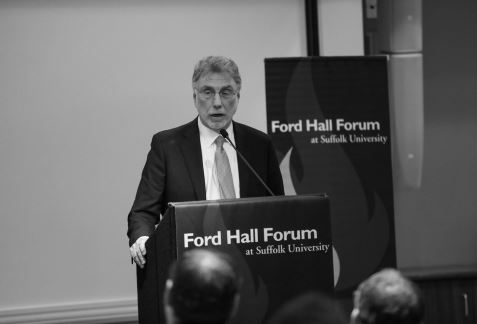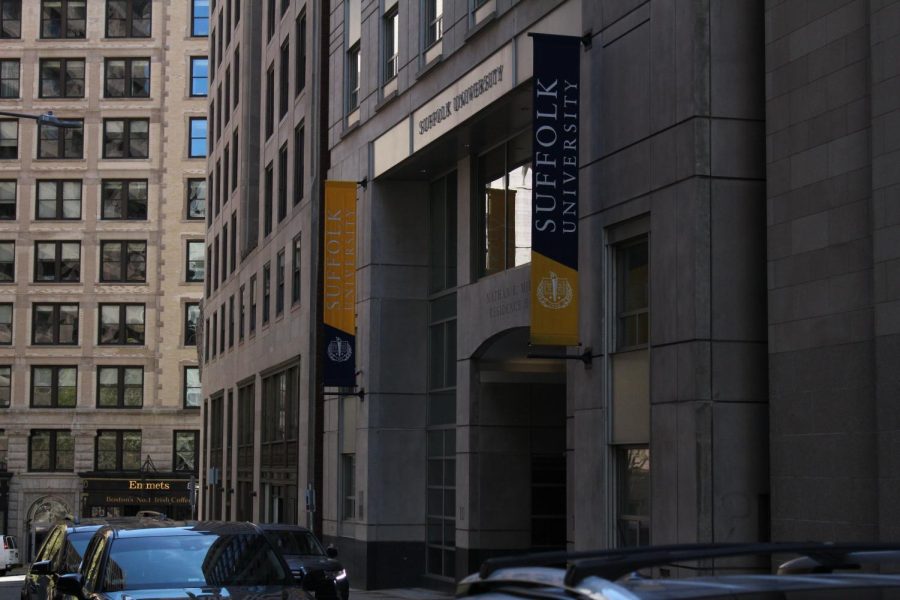
One of America’s most distinguished journalists came to Suffolk University to be presented with the Ford Hall Forum’s 2019 First Amendment Award. Martin, or ‘Marty,’ Baron was the former editor of the Boston Globe from 2001 to 2012, and is the current executive editor of the Washington Post.
“The Forum honors you for your powerful, dogged, determined and fearless defense of the First Amendment, one of the greatest constitutional rights in our country,” said Susan Spurlock, the Executive Director of the Form Hall Forum, as she presented Baron with the award.
Following the presentation, Baron sat down for a discussion about journalism with NPR’s Meghna Chakrabarti.
Baron said his passion for journalism began in his childhood home in Tampa, Florida. His parents were both immigrants, which fueled an interest in what was happening both in this country and around the world. Their media habits included reading the local newspaper, receiving their weekly Time Magazine and watching network and local news channels every evening.
Newsrooms under Baron have won a plethora of awards, including 16 Pulitzer Prizes. Six of those were earned while he was the executive editor of the Boston Globe. The Globe was awarded the Pulitzer Prize for Public Service in 2003 for its investigation into clergy sex abuse in the Catholic Church.
“The day before I was to start, on that Sunday there was a column by Eileen McNamara, a regular columnist at the Globe and she talked about the case of a particular priest John Geoghan who had been accused of abusing as many as 80 kids, and at the end of the column she pointed out that the lawyer for the plaintiffs had alleged that the Cardinal himself, Cardinal Law, was aware of this abuse and yet re-assigned this particular priest from parish to parish,” said Baron in an interview with The Suffolk Journal.
“At the end of the column she said, ‘the truth may never be known,’ which is like chum to journalists. If you say the truth may never be known, well the truth should be known and we should be going after it,” said Baron.
The story of the Globe’s Spotlight team investigation into the Catholic Church was later portrayed in the Academy Award-winning film “Spotlight.” Baron has seen the film and believes it gave great insight into how journalism is actually practiced.
“It gave great insight into how journalism is actually practiced. It was terrific in terms of reminding publishers and owners and editors the importance of investigative journalism, and then reminding the public of why we need investigative journalism,” said Baron to The Journal.
Baron spoke to the audience about the necessity of journalism in protecting the public from people in power and how the public’s trust in news outlets is crucial for maintaining democracy. In order to accomplish this, Baron strives to be transparent as a journalist, and make it clear what kind of work he does and why.
“I make sure that we do the kinds of stories that matter to ordinary people and that we do those sorts of stories regularly, and we get out into the country and into their communities so people see us and see that we’re writing about the things that matter to them, the issues that they care about,” said Baron to The Journal.
The forum concluded with Baron answering questions from the audience, which provided even more insight into his life and career as both a journalist and editor.
“On behalf of Suffolk University I want to say we are especially honored to have Marty Baron with us tonight. Whether it was during your time at Morrissey Boulevard or now in our nation’s capital, we have admired your integrity and your unwavering commitment to the spirit of the First Amendment,” said Suffolk University President Marisa Kelly during the forum. “From near and afar we have read as you and the dedicated journalists that you have led have sought out the truth and brought it to light.”



















